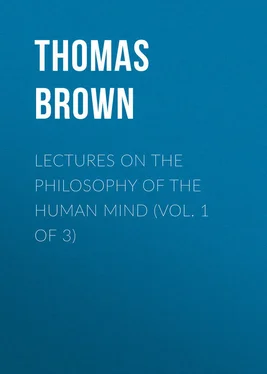Thomas Brown - Lectures on the Philosophy of the Human Mind (Vol. 1 of 3)
Здесь есть возможность читать онлайн «Thomas Brown - Lectures on the Philosophy of the Human Mind (Vol. 1 of 3)» — ознакомительный отрывок электронной книги совершенно бесплатно, а после прочтения отрывка купить полную версию. В некоторых случаях можно слушать аудио, скачать через торрент в формате fb2 и присутствует краткое содержание. Жанр: foreign_antique, foreign_prose, на английском языке. Описание произведения, (предисловие) а так же отзывы посетителей доступны на портале библиотеки ЛибКат.
- Название:Lectures on the Philosophy of the Human Mind (Vol. 1 of 3)
- Автор:
- Жанр:
- Год:неизвестен
- ISBN:нет данных
- Рейтинг книги:5 / 5. Голосов: 1
-
Избранное:Добавить в избранное
- Отзывы:
-
Ваша оценка:
- 100
- 1
- 2
- 3
- 4
- 5
Lectures on the Philosophy of the Human Mind (Vol. 1 of 3): краткое содержание, описание и аннотация
Предлагаем к чтению аннотацию, описание, краткое содержание или предисловие (зависит от того, что написал сам автор книги «Lectures on the Philosophy of the Human Mind (Vol. 1 of 3)»). Если вы не нашли необходимую информацию о книге — напишите в комментариях, мы постараемся отыскать её.
Lectures on the Philosophy of the Human Mind (Vol. 1 of 3) — читать онлайн ознакомительный отрывок
Ниже представлен текст книги, разбитый по страницам. Система сохранения места последней прочитанной страницы, позволяет с удобством читать онлайн бесплатно книгу «Lectures on the Philosophy of the Human Mind (Vol. 1 of 3)», без необходимости каждый раз заново искать на чём Вы остановились. Поставьте закладку, и сможете в любой момент перейти на страницу, на которой закончили чтение.
Интервал:
Закладка:
In the study of what might be considered as the very defects of our moral nature, how pleasing is it, to the philosophic inquirer, to discover that provident arrangement of a higher Power, which has rendered many of the most striking of the apparent evils of life subservient to the production of a general utility, that had never entered into the contemplation of its remote authors. He who has never studied the consequences of human actions, perceives, in the great concourse of mankind, only a multitude of beings consulting each his own peculiar interest, or the interest of the very small circle immediately around him, with little, if any, apparent attention to the interests of others. But he who has truly studied human actions and their consequences, sees, in the prosecution of all these separate interests, that universal interest which is their great result; and the very principle of self-regard thus contributing to social happiness, – unconsciously indeed, but almost as surely as the principle of benevolence itself.
Each individual seeks a several goal,
But Heaven's great view is one , and that the whole.
That counterworks each folly and caprice;
That disappoints the effect of every vice; —
All Virtue's ends from Vanity's can raise;
Which seeks no interest, no reward but praise;
And build on wants, and on defects of mind,
The joy, the peace, the glory of mankind. 17 17 Pope's Essay on Man, Ep. ii. v. 237–240, and 245–248.
I have already, 18 18 Lect. III.
– when treating of the influence of just views of the extent and limits of our faculties, in fixing the proper tone of inquiry, and lessening equally the tendency to the opposite extremes of dogmatism and scepticism, – stated some important moral advantages that arise from this very moderation of the tone of inquiry, particularly with respect to the temper with which it prepares us to receive dissent from our opinions without anger, or insolent disdain, or even astonishment. So much of the intercourse of human society consists in the reciprocal communication of opinions which must often be opposed to each other, that this preparation of the temper, whether for amicable and equal discussion, or for mutual silent forbearance, is not to be lightly appreciated as an element in the sum of human happiness. On this point, however, and on its relation to the still greater advantages, or still greater evils, of national or legislative tolerance or intolerance, I before offered some remarks, and therefore merely allude to it at present.
The tolerance with which we receive the opinions of others is a part, and an indispensable part, of that general refinement of manners to which we give the name of politeness . But politeness itself, in all its most important respects, – indeed in every respect, in which it is to be separated from the mere fluctuating and arbitrary forms and ceremonies of the month or year, – is nothing more than knowledge of the human mind directing general benevolence . It is the art of producing the greatest happiness, which, in the mere external courtesies of life, can be produced, by raising such ideas or other feelings in the minds of those with whom we are conversant, as will afford the most pleasure, and averting, as much as possible, every idea which may lead to pain. It implies, therefore, when perfect, a fine knowledge of the natural series of thoughts, so as to distinguish, not merely the thought which will be the immediate or near effect of what is said or done, but those which may arise still more remotely; and he is the most successful in this art of giving happiness, who sees the future at the greatest distance. It is this foresight acquired by attentive observation of the various characters of mankind in a long intercourse with society, which is the true knowledge of the world; for the knowledge of the mere forms and ceremonies of the world, which is of far easier acquisition, is scarcely worthy of being called a part of it. The essential, and the only valuable part of politeness then, is as truly the result of study of the human mind, as if its minutest rules had formed a regular part of our systems of intellectual and moral philosophy. It is the philosophy indeed of those, who scarcely know that they are philosophizing; because philosophy , to them, implies something which has no other ornaments than diagrams and frightful algebraic characters , laid down in systems, or taught in schools and universities, with the methodical tediousness of rules of grammar; and they are conscious, that all, or the greatest part of what they know, has been the result of their own observation, and acquired in the very midst of the amusements of life. But he, who knows the world, must have studied the mind of man, or at least – for it is only a partial view of the mind which is thus formed – must have studied it in some of its most striking aspects. He is a practical philosopher, and, therefore, a speculative one also, since he must have founded his rules of action on certain principles, the results of his own observation and reflection. These results are, indeed, usually lost to all but to the individual: and the loss is not to be considered as slight, merely because the knowledge, which thus perishes, has been usually applied by its possessor to frivolous purposes, and sometimes perhaps to purposes still more unworthy. When we read the maxims of La Rochefoucauld, which, false as they would be, if they had been intended to give us a faithful universal picture of the moral nature of man, were unfortunately too faithful a delineation of the passions and principles that immediately surrounded their author, and met his daily view, in the splendid scenes of vanity and ambitious intrigue to which his observation was confined, – it is impossible not to feel, that, acute and subtle as they are, many of these maxims must have been only the expression of principles, which were floating, without being fixed in words, in the minds of many of his fellow courtiers; and the instruction, which might be received from those who have been long conversant with mankind, in situations favourable to observation, if, by any possibility, it could be collected and arranged, would probably furnish one of the most important additions which could be made to moral science.
How much politeness consists in knowledge of the natural succession of thoughts and feelings, and a consequent ready foresight of the series of thoughts, which it is in our power indirectly to excite or avert, must have presented itself in a very striking manner to every one, whose professional duties, or other circumstances, have led him to pay attention to the lower orders of society. The most benevolent of the poor, in situations too in which their benevolence is most strongly excited, as in the sickness of their relations or friends, and in which they exert themselves to relieve obvious pain, with an assiduity of watching and fatigue, after all the ordinary fatigues of the day, that is truly honourable to their tenderness, have yet little foresight of the mere pains of thought; and while in the same situation, the rich and better educated, with equal, or perhaps even with less benevolence of intention, carefully avoid the introduction of any subject, which might suggest, indirectly to the sufferer the melancholy images of parting life, the conversation of the poor, around the bed of their sick friend, is such as can scarcely fail to present to him every moment, not the probability merely, but almost the certainty of approaching death. It is impossible to be present, in these two situations, without remarking the benefit of a little knowledge of the human mind, without which, far from fulfilling its real wishes, benevolence itself may be the most cruel of torturers.
Читать дальшеИнтервал:
Закладка:
Похожие книги на «Lectures on the Philosophy of the Human Mind (Vol. 1 of 3)»
Представляем Вашему вниманию похожие книги на «Lectures on the Philosophy of the Human Mind (Vol. 1 of 3)» списком для выбора. Мы отобрали схожую по названию и смыслу литературу в надежде предоставить читателям больше вариантов отыскать новые, интересные, ещё непрочитанные произведения.
Обсуждение, отзывы о книге «Lectures on the Philosophy of the Human Mind (Vol. 1 of 3)» и просто собственные мнения читателей. Оставьте ваши комментарии, напишите, что Вы думаете о произведении, его смысле или главных героях. Укажите что конкретно понравилось, а что нет, и почему Вы так считаете.












![Anne Blunt - A Pilgrimage to Nejd, the Cradle of the Arab Race. Vol. 1 [of 2]](/books/749489/anne-blunt-a-pilgrimage-to-nejd-the-cradle-of-the-thumb.webp)